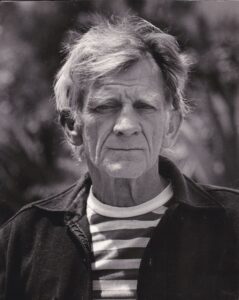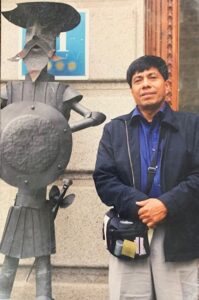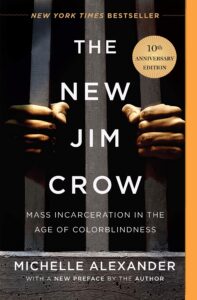Dear Friends and Colleagues from Around the World,
This month’s Culture Watch will highlight books from the “counterculture” era to one from today’s “Black Lives Matter” movement. Two Special Projects will take center stage, starting with my search for a publisher for my second book and my latest article on a Maya activist in Guatemala whose unique experience will inform our documentary film. My new book will be about one of the great, but little-known, authors of the 20th century who wrote on the coast of Ecuador. Next, a quick update on the Rotary/Peace Corps partnership and the Calendar event that will focus on a presentation in Spanish on in-country fundraising to the overseas staff of Esperanca. As always, we’ll have inspiring Voices of the Day, as well as some choice quotes from What Others Are Saying.
Special Projects
 Although I didn’t know Moritz Thomsen, and never corresponded with him, we were both Peace Corps Volunteers involved in agricultural work and his first book, Living Poor, would be “must reading” for thousands of volunteers like myself involved in community development work. His transparency and lifelong commitment to live among, and try to understand, some of the most abandoned people in Ecuador, the different ways he described what he saw and the impact it had on countless ex-pats was an inspiration and something worth emulating.
Although I didn’t know Moritz Thomsen, and never corresponded with him, we were both Peace Corps Volunteers involved in agricultural work and his first book, Living Poor, would be “must reading” for thousands of volunteers like myself involved in community development work. His transparency and lifelong commitment to live among, and try to understand, some of the most abandoned people in Ecuador, the different ways he described what he saw and the impact it had on countless ex-pats was an inspiration and something worth emulating.
Writing would become my second career, which introduced me to the other books written by the man who was recognized as one of the great writers of our time. Having missed him personally, I would fall in love with his books instead, which would reflect in my own life and what I’d sense in his. He would become my “literary patron saint.” As I discovered more about him through extensive research, I learned that a number of talented authors not only had met him, but had written about him far better than I could—Paul Theroux, Tom Miller and Natalie Goldberg, Marcus Covert and Pat Joseph to name a few. Many of the challenges facing us today are revealed in Moritz’s writing, race relations, the need for cross-cultural communications, development work and the art of writing. I’m bringing my reviews and articles together with the essays of these accomplished authors. One title I’m toying with is, “The Old Gringo: A Self-Exiled Writer on the River of Emeralds.” So let me know if any publishers come to mind!
 I first became aware of Victor Montejo almost twenty years ago when I read The Adventures of Mr. Puttison Among the Maya, his historical and satirical novel. The story provided an excellent example of how Mayan and Western worldviews can collide. After reading several of the author’s books more recently, Victor Montejo’s compelling personal life story began to unfold. In 1982, he and his family had to literally flee for their lives to Mexico. He learned English and, with a combination of intellectual drive, persistence, and good luck, earned a Ph.D. in anthropology. In addition to teaching for many years at prestigious American universities and writing many academic treatises, he became a scholar, poet, children’s story writer, and major Mayan public intellectual, recognized nationally and internationally. His writings provide invaluable insights into the Mayan world and his insights will inform the production of our documentary, “Guatemala: Trouble on the Highlands.” The article, “ Victor Montejo’s Dream for a Secure Maya Community,” was just published in “Revue Magazine” and includes nine photographs and a section at the end where I’d like to see your comments. http://www.revuemag.com/2020/10/victor-montejos-dream-for-a-secure-maya-community-by-mark-d-walker/
I first became aware of Victor Montejo almost twenty years ago when I read The Adventures of Mr. Puttison Among the Maya, his historical and satirical novel. The story provided an excellent example of how Mayan and Western worldviews can collide. After reading several of the author’s books more recently, Victor Montejo’s compelling personal life story began to unfold. In 1982, he and his family had to literally flee for their lives to Mexico. He learned English and, with a combination of intellectual drive, persistence, and good luck, earned a Ph.D. in anthropology. In addition to teaching for many years at prestigious American universities and writing many academic treatises, he became a scholar, poet, children’s story writer, and major Mayan public intellectual, recognized nationally and internationally. His writings provide invaluable insights into the Mayan world and his insights will inform the production of our documentary, “Guatemala: Trouble on the Highlands.” The article, “ Victor Montejo’s Dream for a Secure Maya Community,” was just published in “Revue Magazine” and includes nine photographs and a section at the end where I’d like to see your comments. http://www.revuemag.com/2020/10/victor-montejos-dream-for-a-secure-maya-community-by-mark-d-walker/
Culture Watch
 This seemed the perfect time to read a story that took place in the early 1970s, when Jay Parini arrived at the oldest university in Scotland in flight from his draft board in the U.S., which had designs on sending him to Vietnam. I had just published an article about my flight from my draft board that same period, “Crested Butte 1970: Reflections on a Town in Transition.” My flight would be to Guatemala with the Peace Corps, but I also had ties to St. Andrews, Scotland where Parini had escaped. My wife and I visited my mother’s cousin and her husband in Perth, less than an hour from St. Andrews, which perches on the North Sea. I wrote about our trek through the highlands of Scotland in my book, Different Latitudes. So this, and my passion for Latin American literature, made this a must read which I highly recommend! This, and all of my book reviews, can be found on my website under “Library.”
This seemed the perfect time to read a story that took place in the early 1970s, when Jay Parini arrived at the oldest university in Scotland in flight from his draft board in the U.S., which had designs on sending him to Vietnam. I had just published an article about my flight from my draft board that same period, “Crested Butte 1970: Reflections on a Town in Transition.” My flight would be to Guatemala with the Peace Corps, but I also had ties to St. Andrews, Scotland where Parini had escaped. My wife and I visited my mother’s cousin and her husband in Perth, less than an hour from St. Andrews, which perches on the North Sea. I wrote about our trek through the highlands of Scotland in my book, Different Latitudes. So this, and my passion for Latin American literature, made this a must read which I highly recommend! This, and all of my book reviews, can be found on my website under “Library.”
 As part of my ongoing education on “Black Lives Matter,” revisiting the tenth-anniversary edition of this iconic best seller, which the Chronicle of Higher Education deemed “one of the most influential books of the past 20 years” seemed timely. The U.S. still has the highest incarceration rate in the industrialized world and so much of Alexander’s findings hold true today. As Adam Shatz of the “London Review of Books” put it, “It is in no small part, thanks to Alexander’s account, that civil rights organizations such as Black Lives Matter have focused so much of their energy on the criminal justice system.”
As part of my ongoing education on “Black Lives Matter,” revisiting the tenth-anniversary edition of this iconic best seller, which the Chronicle of Higher Education deemed “one of the most influential books of the past 20 years” seemed timely. The U.S. still has the highest incarceration rate in the industrialized world and so much of Alexander’s findings hold true today. As Adam Shatz of the “London Review of Books” put it, “It is in no small part, thanks to Alexander’s account, that civil rights organizations such as Black Lives Matter have focused so much of their energy on the criminal justice system.”
After reading this book, I had to ask myself why so few Americans seem aware of this system and ignore the fact that many whites during the Jim Crow era sincerely believed that African Americans were inferior, and that segregation was a sensible system for managing a society comprised of fundamentally different and unequal people, making Martin Luther King’s words resonate, “Nothing in all the world is more dangerous than sincere ignorance and conscientious stupidity.”
A Partnering for Peace Update: Peace Corps Director Jody Olsen talked with the Partnering for Peace members (I’m the membership chair) via Zoom. As the Peace Corps celebrates its 60th anniversary, the director said there are 240,000 Returned Peace Corps Volunteers in 142 countries and the newest program will be in Vietnam. With no volunteers in the field at this time due to Covid 19, we discussed how the partnership with Rotary International can support evacuees at home and volunteers when they return to the field. Go to our website for more: www.PartneringforPeace.org
I’ve also been attending Zoom gatherings with a collection of my World Neighbors colleagues. I was the Development Director in Oklahoma City in the early 1990s. These former staffers represent some of the best international development professionals in the business. Some of these relationships go back some 40 years, over which time several members have set up impressive international development initiatives like Groundswell International, EPIC and Friends of Pariwar Nepal. The group is learning more about these programs, the impact of climate change on global migration and how to transition from existing leadership of smaller NGOs (non-governmental organizations) to younger leaders, in order to assure their future sustainability.
Calendar
On November 4th , I’ve been asked to speak to the overseas staff of Esperanca about in-country fundraising. Directors will represent Mexico, Nicaragua, Ecuador, Peru, Bolivia and Mozambique so I’ll make the presentation in Spanish. We’ll explore important trends in global fundraising, but for the most part, I’ll be listening for the staff’s insights on best practices in order to identify trends to enhance their efforts to generate additional resources for their work. This relief and development agency is celebrating its 50th anniversary and I was considered for the CEO position in 2011 before becoming the CEO of Hagar, so I know them well and welcome the opportunity to work with them again. You can learn more at https://www.esperanca.org/
I’ve already enrolled for the Desert Nights Literary Fair, which starts on February 22nd on the campus of ASU in Tempe, Arizona. The Virginia Piper Center for Creative Writing hosts the event, which I’ve attended in the past. The event will bring together 25 faculty members and, although it’s via Zoom, I anticipate seeing some of the top writers, agents and publishers in the country. https://piper.asu.edu/conference/fair/schedule/2020
Voices of the Day
One’s destination is never a place, but rather a New Way of Looking at Things.
–Henry Miller, Author
Freedom is not a state; it is an act. It is not some enchanted garden perched high on a distant plateau where we can finally sit down and rest. Freedom is the continuous action we all must take, and each generation must do its part to create an even more fair, more just society.
– John Lewis, Civil Rights Leader, Statesman
What Others Are Saying
A 5-star review for my book, Different Latitudes: “Especially in these days of Covid, it’s too easy for me to forget about the world: the broad world filled with other cultures, in many of which people struggle just to survive. Different Latitudes brings that world home. Its stories are evocative, sometimes humorous and always compelling. Because I was in the Peace Corps myself, in El Salvador, and because I married a Salvadoreña, I found the sections on Central America especially moving. But Mark Walker truly has his eye on the wide world, and his concern for the poor of Africa, Asia and South America is what guides this inspiring book. It starts with the Peace Corps and expands from there. Walker, I imagine, has been keeping notes, or a journal, his whole life, for his stories are filled with the graphic details that make a book sing.” John Thorndike, award winning author of, A Hundred Fires in Cuba.
On my latest, “The Million Mile Walker Review: What We’re Reading and Why” column, which included a review of White Fragility and Cast: The Origins of Our Discontents:
”Before I forget, I want to let you know how much I loved your column this month. It is so timely and so important. You put a lot of heart into it and I hope it stirs people to action for our brothers and sisters of color. Thank you for writing it, Katy”. -Kathleen Cook, Editor of the Arizona Authors Association Newsletter.
On my two “Counterculture” articles in the “Crested Butte News”: “Mark, these pieces have everything. They are thoughtful, well-shaped, and interesting. Congratulations.” – MJ Mark Jacobs, fellow Returned Peace Corps Volunteer, award-winning author of five books including, Stone Cowboy and over 160 articles in literary magazines.
On my article in this month’s issue of “Revue Magazine”. The article on Victor Montejo was most interesting. I liked what he said concerning the controversy over Rigoberta Menchu: “They have forgotten that all writings are ‘suspicious’ and that they represent the political or ideological conditioning, or tendencies of the individual who produces them.” In this light, I see the division between fiction and “truth” as one that has been steadily evaporating”. – John Thorndike, fellow Returned Peace Corps Volunteer and award-winning author of , A Hundred Fires in Cuba.
Please check out my new Million Mile Walker website, which includes all my articles and book reviews under “Books Articles” and “Library”, as well as a “Special Message” video, https://millionmilewalker.com. The Guatemala documentary website is: https://www.guatemalastory.net/
“Follow” me on the Million Mile Walker Facebook page for the latest on international affairs and literature.
http://www.facebook.com/millionmilewalker/?modal=invite_friend.
And, as always, if you’ve read “Different Latitudes: My Life in the Peace Corps and Beyond,” by all means, rate it on Amazon, Barnes & Noble and GoodReads, or if you don’t have it, please consider purchasing it.
Shalom!
Mark D. Walker